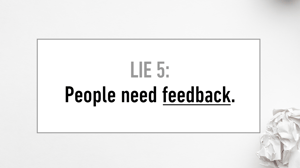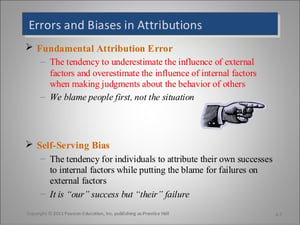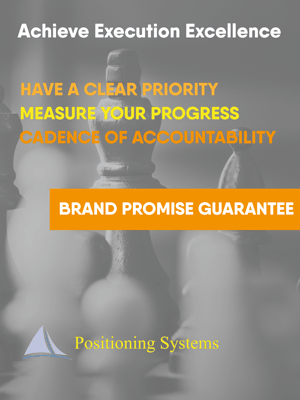 Do your people need feedback?
Do your people need feedback?
It’s hard to go anywhere in business, sports, even our personal lives without hearing the need for feedback.
Authors, Marcus Buckingham and Ashley Goodall in Nine Lies About Work: A Freethinking Leader’s Guide to the Real World go against the grain to share why feedback isn’t good, but also how to maximize performance through attention rather than feedback.
Watch Marcus Buckingham’s 6-minute video on Lie 5: People Need Feedback.
Feedback is based on three false assumptions:
- I Am The Source Of Truth About You (The only reliable source of truth about you is you.)
- Learning Is Filling Up An Empty Space. (Learning is more insight and generating something from within)
- Excellence Can Be Defined In Advance. (Go to 4:09 in the video to hear Buckingham share how Excellence in free throw shooting can’t be defined in advance.)
In Nine Lies About Work: A Freethinking Leader’s Guide to the Real World the authors, share two well-documented oddities of human nature to help you to understand why feedback isn’t necessarily good.
Fundamental Attribution Error - Actor-Observer Bias
The Fundamental Attribution Error and its cousin the Actor-Observer Bias, lead us to believe your performance is due to who you are—your drive, or style, or effort. To fix a performance problem we instinctively turn to giving personal feedback, rather than looking at the external situation you are facing and addressing it.
 We covered the Fundamental Attribution Error previously in Human Reactions to Systems – Understanding Fundamental Attribution Error and Communication Barrier – Fundamental Attribution Error. When someone does something to annoys or inconvenience us, we’re sure it’s because there’s something wrong with the person.
We covered the Fundamental Attribution Error previously in Human Reactions to Systems – Understanding Fundamental Attribution Error and Communication Barrier – Fundamental Attribution Error. When someone does something to annoys or inconvenience us, we’re sure it’s because there’s something wrong with the person.
In our self-attributions, we skew the other way, assigning our behavior to the external situation around us, to what’s happening to us.
The authors’ point to “the Actor-Observer Bias is one of a number of human-reasoning biases that fall into a category called self-serving biases, because they serve to explain away our own actions in a way that props up our self-esteem.
These biases lead us to believe that your performance (whether good or bad) is due to who you are—your drive, or style, or effort, say—which in turn leads us to the conclusion that if we want to get you to improve your performance we must give you feedback on who you are, so that you can increase your drive, refine your style, or redouble your efforts.
To fix a performance problem we instinctively turn to giving you personal feedback, rather than looking at the external situation you were facing and addressing that.
One of the inconvenient truths about humans is that we have poor theories of others, and these theories lead us, among other things, to design our working world to remedy or to insulate against failings that we see in others but don’t see in ourselves.
Weekly Check-Ins
How do you manage without feedback? Switch to attention as the authors of Nine Lies About Work: A Freethinking Leader’s Guide to the Real World recommend.
 Every week have a brief check-in with each team member. Ask two simple questions:
Every week have a brief check-in with each team member. Ask two simple questions:
- What are your priorities this week?
- How can I help?
Don’t look for a to-do list. You simply want to discuss their priorities, obstacles, and solutions in real time, while the work itself is ongoing. Making sense of it together can happen only in the NOW.
Each check-in is a chance to offer a tip, or an idea to help your team member overcome a real-world obstacle, or a suggestion for how to refine a skill.
Check-ins are short—ten to fifteen minutes—plenty of time for a little real-time learning and coaching.
The most important insights shared by the best team leaders: frequency trumps quality.
It’s less important each check-in is perfectly executed, than it happens, every week. In the intelligence business, frequency is king.
Checking in is like teeth-brushing: you brush your teeth every day. You hope each brushing is high quality, what’s important is it happens, every day.
What’s Your Span of Control?
You might be saying, Doug, I would love to check in with my people every week, but I can’t. I’ve simply got too many people!
The weekly check-in is the single most powerful ritual of the world’s best team leaders. You now know the exact span of control right for every single team leader.
 It’s the number of people you, and only you, can check in with every week.
It’s the number of people you, and only you, can check in with every week.
The authors explain, “If you can check in with eight people, but you can’t fit nine into your schedule, your span of control is eight. If you can find a way to check in with twenty people, then your span of control is twenty. And if you’re one of those people who can legitimately manage a weekly check-in with only two people, your span of control is two. Span of control, in other words, isn’t a theoretical, one-size-fits-all thing. It’s a practical, function-of-team-leader’s-capacity-to-give-attention thing. Your span of control is your span of attention. In the service of intelligence, then—in the service of making sense of real-time information together—the weekly check-in is the anchor ritual.
This is the work of leading. If you don’t like this, if the idea of weekly check-ins bores or frustrates you or you think that once a week is just “too much,” that’s fine.”
Just know this is about building of trust.
Watch Marcus Buckingham’s 4-minute video FOCUS YOUR PEOPLE to learn more.
Growth demands Strategic Discipline.
 How can you build an enduring great organization?
How can you build an enduring great organization?
You need disciplined people, engaged in disciplined thought, to take disciplined action, to produce superior results, making a distinctive impact in the world.
Discipline sustains momentum, over a long period of time, to lay the foundations for lasting endurance. It’s the framework for Good to Great:
- Stage 1: Disciplined People
- Stage 2: Disciplined Thought
- Stage 3: Disciplined Action
- Stage 4: Build Greatness
Positioning Systems is obsessively driven to elevate your teams Discipline. A winning habit starts with 3 Strategic Disciplines: Priority, Metrics and Meeting Rhythms. -1.jpg?width=300&name=3%20Disciplines%20of%20Execution%20(Strategic%20Discipline)-1.jpg) Your business dramatically improves forecasting, accountability, individual, and team performance.
Your business dramatically improves forecasting, accountability, individual, and team performance.
Creating Execution Excellence demands creating/defining, understanding, with creativity and DISCIPLINE your Flywheel.
Meeting Rhythms achieve a disciplined focus on performance metrics to drive growth.
Positioning Systems helps your business achieve these outcomes on the Four most Important Decisions your business faces:
|
DECISION |
RESULT/OUTCOME |
|
PEOPLE |
|
|
STRATEGY |
|
|
EXECUTION |
|
|
CASH |
|
We help your business Achieve Execution Excellence.
Positioning Systems helps mid-sized ($5M - $250M) business Scale-UP. We align your business to focus on Your One Thing! Contact dwick@positioningsystems.com to Scale Up your business! Take our Four Decisions Needs Assessment to discover how your business measures against other Scaled Up companies. We’ll contact you.
 Next Blog – Lie 6: People Can Reliably Rate Other People
Next Blog – Lie 6: People Can Reliably Rate Other People
The Fundamental Attribution Error and the Actor-Observer Bias skew our ability to rate others. Next week why rating others is like a quote I love, “When we judge others, we don’t define them, we define ourselves.” Wayne Dwyer.






.jpeg?width=150&height=135&name=Hand%20with%20marker%20writing%20the%20question%20Whats%20Next_%20(1).jpeg)

